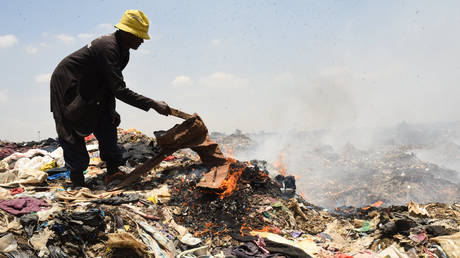
Germany, Poland, and the UK are responsible for sending the most junk garments to the African nation
The EU and UK export a combined 74 million items of waste clothing to Kenya every year, an investigation by two NGOs has found. These useless textiles are often burned or dumped in landfills, despite most of them being made of toxic synthetic materials, the report claimed.
Published last week, the report found that of the 149 million items of used textiles exported to Kenya every year by the EU and UK, 74 million are instantly classified as waste upon arrival. Furthermore, almost 50 million of these waste items are plastic-based, meaning they cannot be easily disposed of.
Germany sends more of this waste clothing than any other European country, shipping 25 million waste items to Kenya every year. Poland is in second place, sending 18.5 million, with the UK sending 18.3 million. These three countries, along with Hungary, Italy, Belgium, Lithuania, Estonia, France, and Ireland, are responsible for 95% of all second-hand clothing exports from the EU to Kenya.
These statistics were compiled by Clean Up Kenya and Wildlight on behalf of the Netherlands-based Changing Markets Foundation. In researching the report, teams from these NGOs found plastic-based clothing piled four storeys high in a dump in Nairobi, with items spilling into a river.
Items that aren’t piled into similar landfills are often burnt for fuel, the report claimed. Burning polyester clothes – which account for more than two thirds of textiles produced worldwide – “is highly toxic and contributes to air pollution as well as a myriad of health problems,” the report’s authors stated.
Importing used clothing is a thriving industry in Kenya that employs up to 2 million people. However, while the report says that “the lion’s share” of imports from Europe are waste, an industry spokesperson told Euronews that this is “misinformation.”
“This European report assumes that [clothing]traders in Kenya spend their money importing 50 per cent waste,” the spokesperson said, adding that importers would be “fools” to do this. “This report is demeaning and an insult to all who work in the second-hand clothes trade across the continent and by spreading misinformation it further threatens millions of livelihoods,” she added.




